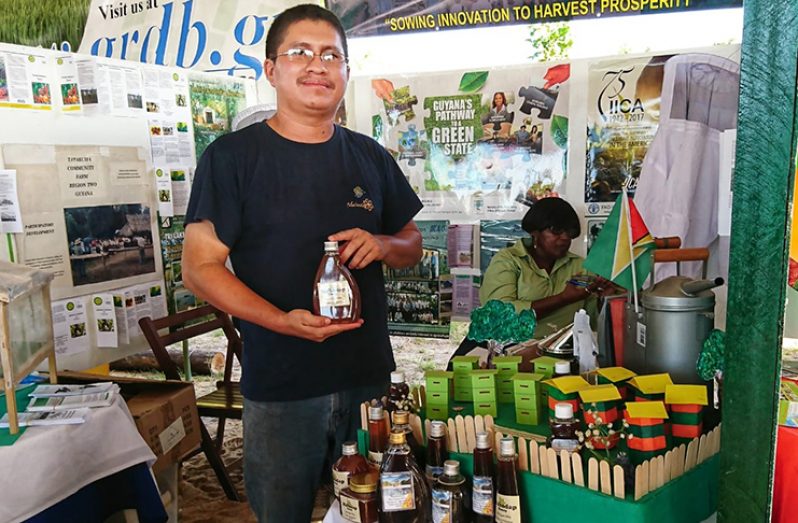How one beekeeper realised he was meant to be doing what he loved
YIMOCHI Melville was on a scholarship in Cuba pursuing automation engineering, when he became disinterested in his studies and longed to be back home so that he could go after his true passion – to “get back to the soil”, and become more involved in the agricultural activities that he was exposed to as a child.
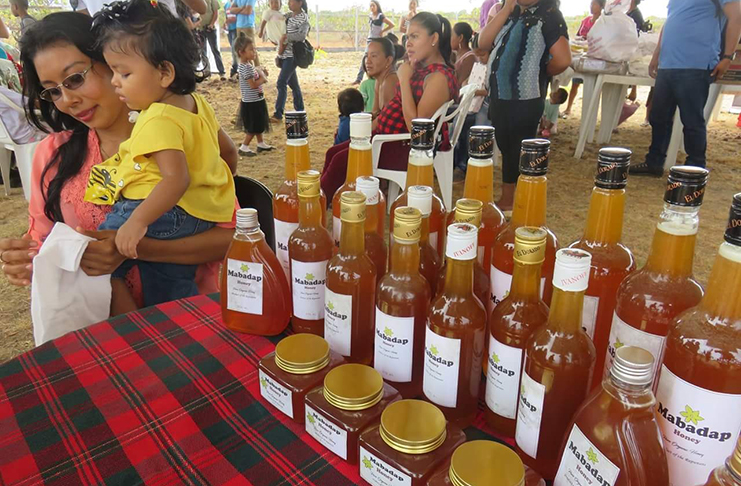
Yimochi, 37, was born and raised at Mabadap, Culvert City, Lethem, to parents Charles and Collette who did cattle ranching to support the family.
“We had a lot of fruit trees in the yard. We did cattle; pigs, crops, vegetables and corn on a subsistence level. As a child, I helped mostly with cattle ranching. My father sent us to bring out the cows, slaughter, herd them. We also helped out a little with the crops,” Yimochi fondly recalls.
He spoke to the Pepperpot Magazine on the sidelines of the ninth Caribbean Beekeeping Congress which opened last week at the Guyana School of Agriculture, Mon Repos, East Coast Demerara.
Yimochi may not have given much thought to the meaning of “Mabadap,” the place where he grew up. Today, though, when he is pursuing beekeeping in the Region 10 town, and the Wapishana meaning, “Bees House,” has much significance to him.
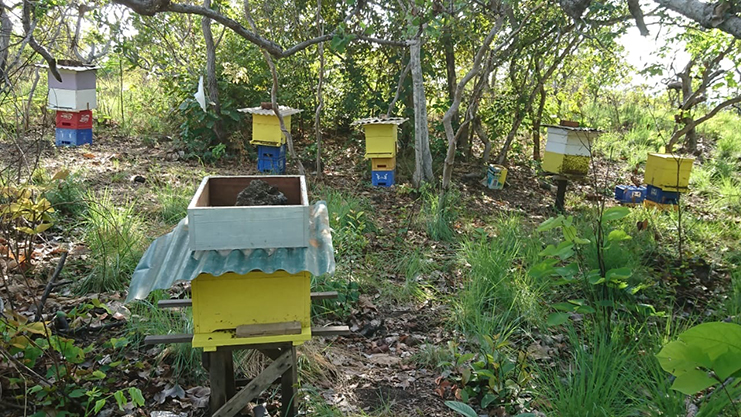
“It is not a direct translation; the exact translation is, ‘mab dap.’ However, Mabadap is a name derived from the Wapichan language, which is the name my grandparents gave to the new place they made home after leaving Guyana as refugees and then returning and finding all their property destroyed. They chose the name Mabadap because the house they built was a huge thatch house with many rooms, not unlike a bees hive.”
No matter what he did or where he went, today he can look back and see that he’s always had an interest in beekeeping. Perhaps his curiosity was aroused when his dad would always talk about beekeeping, while never having the know-how to actually pursue it.
Beekeeping Workshop, First beehive box
Yimochi attended Saint Ignatius Primary in Lethem and then Christ Church Secondary on a scholarship. He transferred to Saint Stanislaus College where he completed fifth and sixth forms.

On another government scholarship, Yimochi left Guyana for Cuba to study for five years. “I never graduated; I came back here and that was the end of my formal studies. I was interested in doing engineering at that time, but in hindsight, I probably wouldn’t have chosen that field.
“I became disinterested in what I was studying; my grades started to fall and I lost interest entirely. I was looking to become more involved in agriculture, to get back to the soil. As a child, my father did ranching, leather work and farming; so we always had an interest in those areas,” he recalled.
When Yimochi returned to Guyana in 2007, he opened a copy centre called Melville’s Photo Shop but opted to close it due to slow business and a robbery that affected him a lot. “All during that time, I had an interest in beekeeping. But I did whatever jobs I could get my hands on.”
In 2009, though, IPED hosted a workshop with one of its partners in Brazil on beekeeping, and this was just what Yimochi needed to start the ball rolling. “I took that course for a week and from then I was able to understand the bees, and how to go about making a start.” The information gathered at the workshop was especially helpful as there were not a lot of persons in Lethem and the Rupununi with beekeeping knowledge.
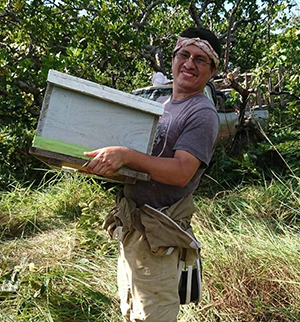
Yimochi purchased his first beehive box in 2012 and in the same year, captured his first hive. “Since then, I have managed to increase the bees. Sometimes I have four hives at a time. I had no one to reach out to, to help me understand. But I had them there and I went along by trial and error.
The internet, especially social media, worked to Yimochi’s advantage in that he was able to connect with fellow beekeepers across the world. He also read up as much as he could on the subject, having bought a few books online.
Yimochi’s help continued to increase when he met Linden Stewart from the Guyana Apiculture Society and Dexter Lyken from the Guyana Livestock Development Authority. “They have helped me a lot to grow my activities. So now, I have 12 hives and they are doing well. I have six of them close to my home, another four close to the Kanuku Mountains and the others are in the Savannahs.” All of his bees are considered Africanised bees.
Yimochi was really grateful to be able to participate at the Congress so as to be able to better understand how things are done in Guyana. “While I met many beekeepers online, I haven’t been able to meet them in person, so I was able to learn some of their techniques and exchange information.”
A BEEKEEPER’S HARD WORK
Yimochi says that to be an effective beekeeper, you first need to overcome your fear of bees. “So far, I have captured hives from the wild; trees in the savannah, under a bridge, in someone’s home. I take my hive boxes to the location and place the bees inside. Sometimes you are not successful, but as I go along, I learn how to capture more successfully. You need your smoker, veil, gloves, hive tools, and proper boxes.”
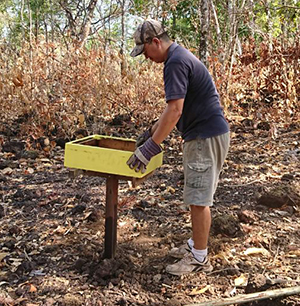
Explaining the process, Yimochi said: “You try to make the bees comfortable in the box so they would make it their home. If they have combs when you capture them, you put the combs in the box the way they would be in nature so they would feel it’s their home and stay. If they are not comfortable, they will leave. They usually go out to feed, but once they are comfortable, they will always come back. You make sure the queen is laying well and if not, get another queen. The queen is larger in size, has a longer abdomen, and is a bit more reddish coloured.”
“Sometimes we help them out with some syrup made of white sugar mostly, so they can start attaching their combs to the frames that you have in the hives. Once they start doing that, you know they are comfortable. As you see them increasing in size, you need to keep adding boxes because if they run out of space, they will split in half; half will go and half will remain. They will remain in the hive and if you’re lucky, you will get honey,” he continued.
Yimochi says a lot of hard work is involved. “But when you like something, it doesn’t feel like work. You get to enjoy going outdoors; walking about in the bush, everything that I love doing.”
NO IMMEDIATE RETURNS
Yimochi started off beekeeping as a hobby, but now does it as a side business. His main business is his butcher shop near the Lethem airstrip.
He is hoping to increase his hives so that he can actually have honey to sell. At the moment, it is impossible for him to supply the demand he has from even family and friends.
One of the biggest hurdles that Yimochi has to deal with is finding the capital to invest. “Beekeeping doesn’t have a return right away. You need at least two years before you actually see any returns. There’s no financial institution that will give you a loan and then wait two years before you start making any installments, so I have to spend whatever money I have and slowly, slowly go along. It’s a long-term investment.”
As a word of advice, Yimochi said if attacked, someone should simply move away from the bees as soon as possible and eventually, they will retreat.
“Bees don’t trouble you unless you trouble them, or something troubles them. They are normally calm and doing their thing, they don’t go attacking anybody just like that. When they attack, it’s usually a defence response,” he said.
Yimochi is in the process of creating a small group of beekeepers in the Rupununi which is called the “Rupununi Friendly Beekeepers.” It has five members so far.



.jpg)




